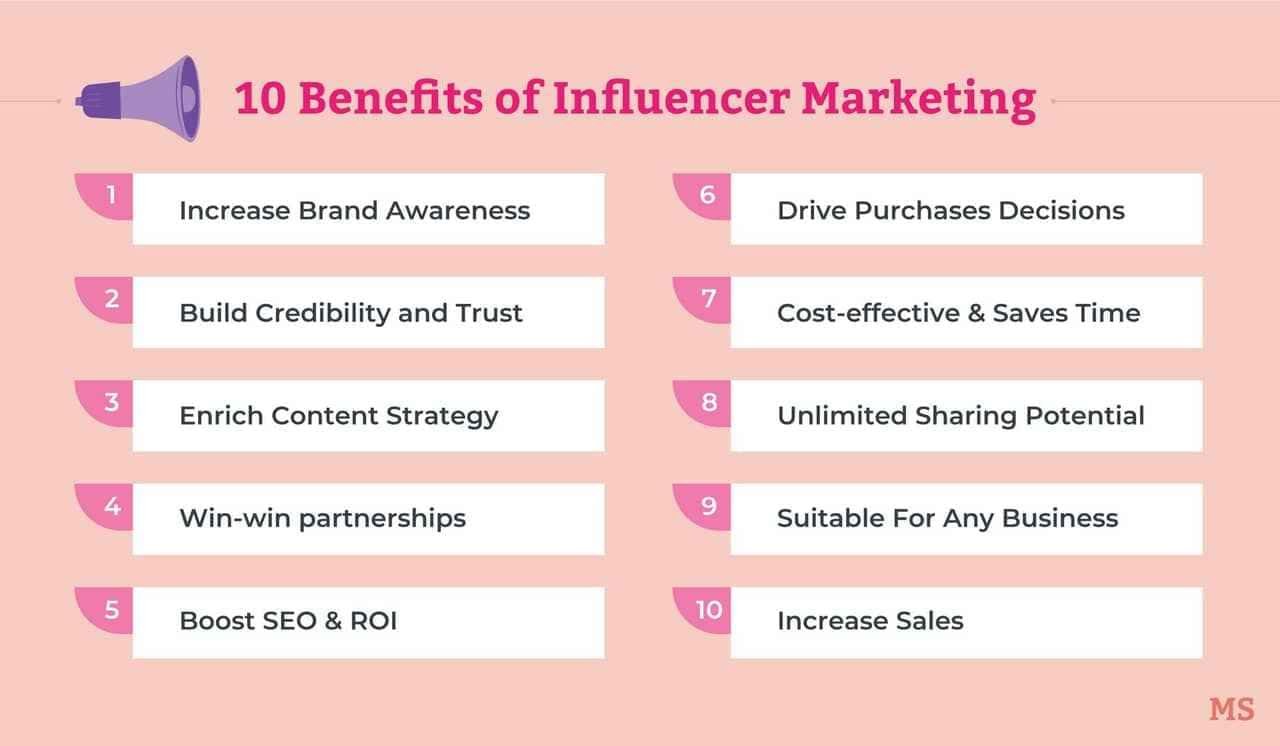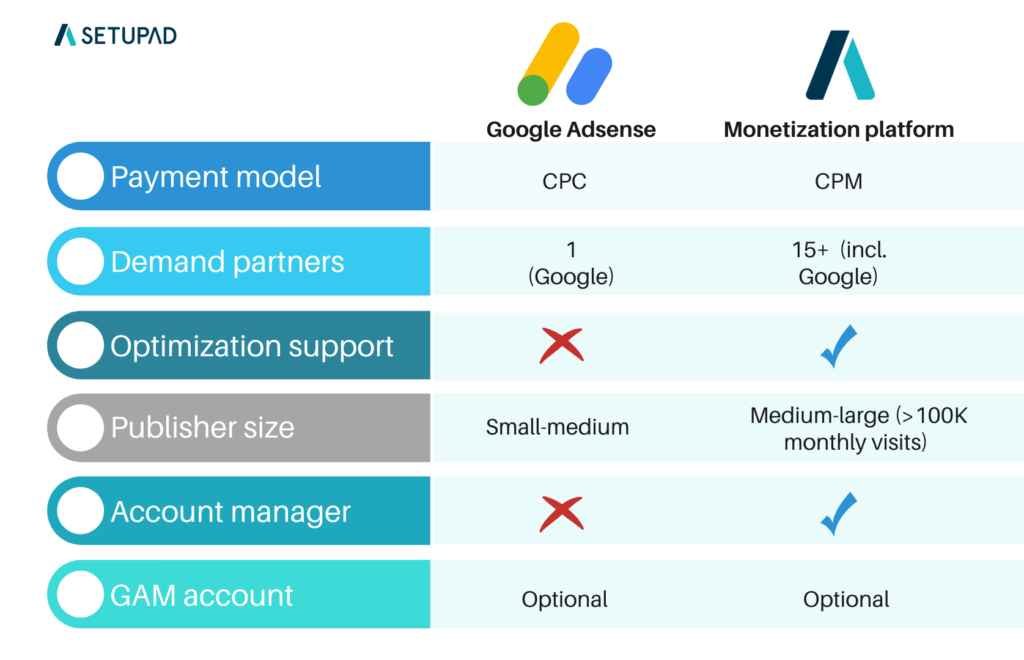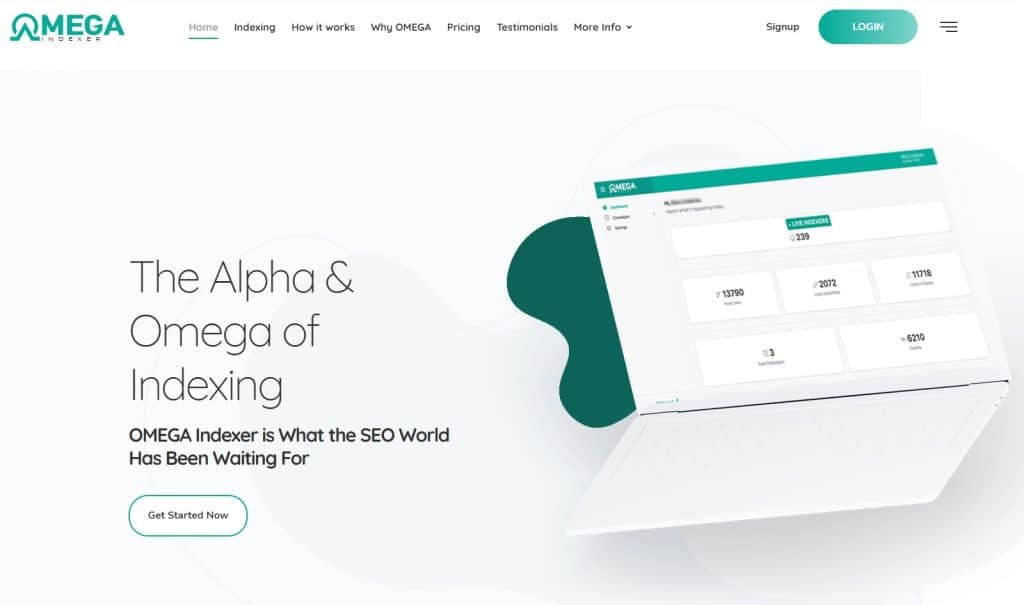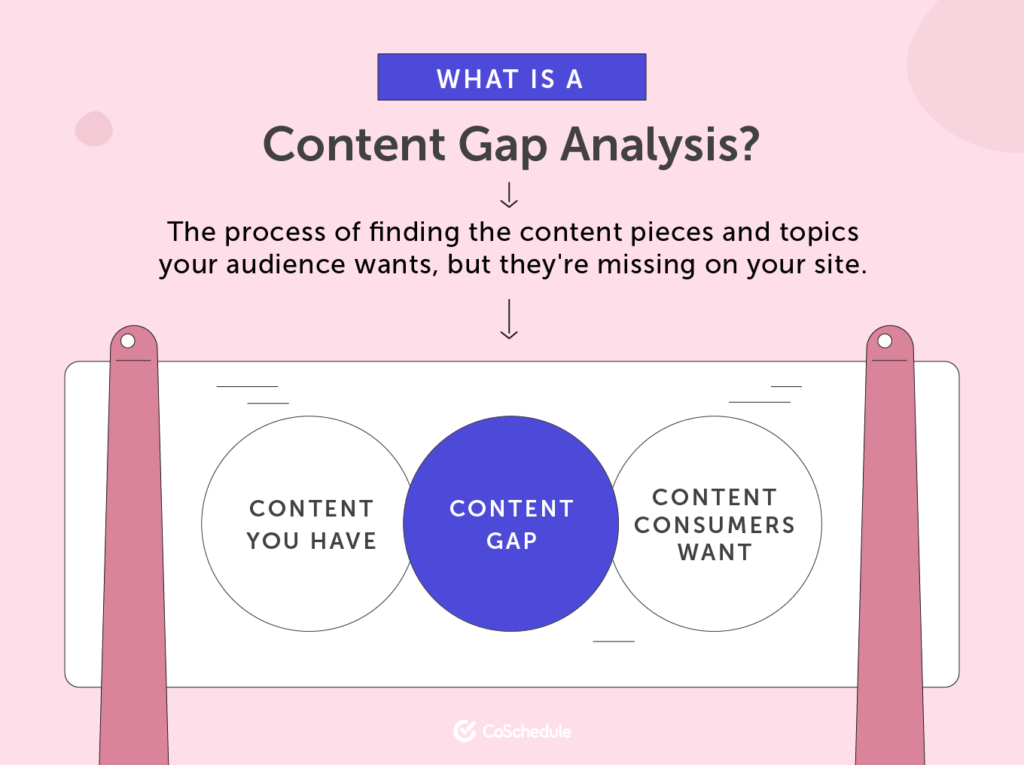In today’s fast-paced digital age, social media platforms have become a powerful tool not only for networking and keeping in touch with loved ones but also for monetization. Two methods that stand out when it comes to making money through social media are Adsense and Influencer Marketing. For those looking to channel their online presence into a cash cow, the choice between these two can be a daunting one. As a marketing expert with years of experience under my belt, I have examined the strengths and weaknesses of each method and now bring you this informative comparison article on Adsense vs. Influencer Marketing: Monetizing Social Media. So buckle up, as we dive in and explore which approach is best for you.
Comparison Table: Adsense vs. Influencer Marketing: Monetizing Social Media
Adsense | Influencer Marketing | |
|---|---|---|
Description | Google’s advertising program where website owners can earn revenue by displaying ads on their websites | A marketing strategy where brands collaborate with social media influencers to promote their products or services |
Earning Potential | Based on ad clicks or impressions, can range from a few cents to several dollars per click/impression | Varies based on the influencer’s following, type of content, and brand collaboration, can range from a few hundred dollars to several thousand dollars per collaboration |
Reach | Ads displayed on websites with high traffic, can reach a large audience | Depends on the influencer’s following, can range from a few thousand to several million followers, with a targeted audience |
Control | Website owner has limited control over which ads are displayed on their website | Brands have control over the content and messaging of the influencer’s post, but the influencer has creative control over the post’s format and style |
Trust | Ad format may be less trusted by consumers as it can be seen as interruptive or intrusive | Influencer’s followers often have a high level of trust in the influencer, which can translate to trust in the brand/product being promoted |
Longevity | Ads can be displayed for as long as the website owner chooses to keep them up, but ad revenue can fluctuate | Collaborations between brands and influencer’s typically last for a set amount of time or a particular campaign, but can lead to longer-term partnerships |

Adsense vs. Influencer Marketing: Monetizing Social Media
Adsense
Description: Adsense is a program offered by Google to website owners and bloggers that allows them to serve automated text, image, video, or animated advertisements on their websites. The program pays website owners a percentage of the revenue generated by these ads, based on clicks or impressions.
Pros: Adsense is easy to set up and use, and provides a steady stream of revenue. It is also highly scalable, as website owners can easily increase the number of ads on their site to maximize revenue. Google also offers a range of ad formats, targeting options, and customization options to help website owners optimize revenue.
Cons: Adsense requires a large volume of traffic to generate significant revenue, and smaller website owners may struggle to reach this threshold. In addition, Adsense ads can be intrusive and disrupt the user experience, leading to lower engagement and repeat visitors. Finally, Adsense is highly strict with its policies and can cancel and suspend accounts for seemingly small violations.
Key points:
- Easy to set up and use
- Highly scalable
- Range of ad formats, targeting options, and customization options
- Requires significant traffic to generate significant revenue
- Can be disruptive to the user experience
- Strict policies
Features: Reporting, revenue optimization, targeting options, AdSense policies, ad formats
Quantitative measurements: AdSense publishers typically earn between $0.01 and $0.30 per click, with earnings varying widely depending on the industry, niche, location, and competition. According to Google, AdSense publishers worldwide made over $10 billion in revenue in 2020.
Reasons to consider: Adsense is a good option if you have a website with significant traffic and want to monetize it with minimal effort. It is also a good option if you want to leverage Google’s powerful targeting and optimization features to maximize revenue. However, it may not be a good fit if you have low traffic and don’t want to sacrifice the user experience or risk account suspension.
Influencer Marketing
Description: Influencer marketing is a type of social media marketing that involves partnering with individuals who have large and engaged followings on social media, such as Instagram, YouTube, or TikTok. Brands partner with these influencers to endorse and promote their products or services, and pay them a fee or commission based on the number of followers and engagement they have.
Pros: Influencer marketing is highly effective in reaching targeted and engaged audiences, as they trust the influencers they follow and are more likely to take action based on their recommendations. Influencer marketing is also highly scalable, as brands can partner with a wide range of influencers across multiple social media platforms. Finally, influencer marketing can be highly cost-effective, as the fees paid to influencers are often lower than traditional advertising methods.
Cons: Influencer marketing can be difficult to measure and track, as there is no standardized way of reporting engagement and conversions. In addition, influencer marketing can be risky, as influencers can damage a brand’s reputation if they engage in unethical or controversial behavior. Finally, influencer marketing can be competitive, as brands need to stand out and win over influencers who may be approached by dozens of other brands every week.
Key points:
- Highly effective in reaching targeted and engaged audiences
- Highly scalable across multiple social media platforms
- Can be highly cost-effective
- Difficult to measure and track engagement and conversions
- Risky, with potential damage to a brand’s reputation
- Highly competitive
Features: Influencer discovery and outreach, campaign management, metrics tracking, influencer management, pricing and negotiation tools
Quantitative measurements: According to a survey by Influencer Marketing Hub, the average cost per sponsored post on Instagram is $300-$1000, with larger influencers charging upwards of $2500 per post. Another survey found that influencer marketing generates an average of $6.50 in revenue for every dollar spent.
Reasons to consider: Influencer marketing is a good option if you want to reach targeted and engaged audiences on social media, and are willing to invest in building relationships with influencers. It is also a good option if you want to create authentic and engaging content that resonates with your audiences, rather than relying on automated ads. However, it may not be a good fit if you lack the budget or resources to commit to a long-term influencer marketing strategy, or if you are risk-averse and want to avoid any potential damage to your brand’s reputation.
Suggestions for potential users
Both Adsense and Influencer Marketing are viable options for monetizing social media, depending on your goals, budget, and resources. Here are some suggestions for potential users:
- If you have a website with significant traffic and want to monetize it with minimal effort, and are willing to sacrifice some user experience and risk account suspension, Adsense is a good option.
- If you want to reach targeted and engaged audiences on social media, create authentic and engaging content, and are willing to commit to a long-term influencer marketing strategy, Influencer Marketing is a good option.
- If you are unsure which option to choose, consider a hybrid approach that combines both Adsense and Influencer Marketing, to maximize revenue and diversify your income streams.

Guidelines for Using Adsense vs. Influencer Marketing: Monetizing Social Media
1. Understand the Differences
Adsense and influencer marketing serve two different purposes. Adsense is an automated advertising program that generates revenue through clicks on ads displayed on your social media page. Influencer marketing involves partnering with brands to promote their products or services through sponsored posts or collaborations. Understand and evaluate which strategy aligns best with your social media goals and revenue targets.
2. Build Your Audience
Whether you choose Adsense or influencer marketing, it’s critical to have a strong following to increase engagement and generate revenue. Work on building your audience by consistently publishing high-quality content, engaging with your followers, and utilizing relevant hashtags. Brands seek influencers that can reach and engage with a broad audience, so focus on growing your followership.
3. Maintain Authenticity
In order to maintain credibility with your audience and attract loyal brand partnerships, it’s essential to maintain authenticity in your content and collaborations. Only choose brands/products that align with your values and resonate with your audience. Avoid overselling and being too promotional, as this can turn off your followers.
How To About Adsense vs. Influencer Marketing: Monetizing Social Media You Need To Know
1. How to determine which method is best for monetizing your social media account?
Answer: The best way to determine which method is best for monetizing your social media account is to analyze your audience and niche. If your audience is engaged and interested in your content, influencer marketing may be more effective. However, if you have a high volume of traffic to your website or blog, Adsense may be the better option.
2. How to set up an Adsense account and start earning money through social media?
Answer: To set up an Adsense account, visit the Adsense website and sign up for an account. After your account is approved, you can create ad units and place them on your social media pages. Each time a user clicks on an ad, you will earn a percentage of the ad revenue.
3. How to become an influencer and monetize your social media accounts?
Answer: To become an influencer, you must first build a significant following on your social media platforms. Create engaging content, use relevant hashtags, and interact with your followers consistently. Once you have a considerable following, you can work with brands to promote their products in exchange for payment or compensation.
4. How to negotiate with brands for influencer marketing campaigns?
Answer: When negotiating with brands for influencer marketing campaigns, it’s important to have a strong understanding of your value and reach. Determine your rates based on the number of followers, engagement rate, and overall reach. Be confident in your negotiations and don’t be afraid to ask for what you’re worth.
5. How to track and analyze the success of your monetization efforts on social media?
Answer: To track and analyze the success of your monetization efforts on social media, use analytics tools such as Google Analytics or social media analytics platforms. Monitor key metrics like engagement rate, click-through rate, and overall revenue generated. Use this data to refine and improve your monetization strategy over time.
Frequently Asked Questions for Adsense vs. Influencer Marketing: Monetizing Social Media
1. What is the difference between Adsense and Influencer Marketing?
Adsense is a program by Google that allows website owners to earn money by displaying ads on their web pages. On the other hand, influencer marketing involves partnering with social media influencers to promote products or services to their followers.
2. Which one is more effective for monetizing social media?
It depends on your goals. Adsense is great for websites with high traffic volumes, while influencer marketing is more effective for reaching a targeted audience and driving conversions. If you have a specific product or service to market, influencer marketing may be the right choice.
3. Which one provides a better return on investment (ROI)?
Again, this depends on your goals and the nature of your business. Adsense typically offers a relatively low ROI, as clicks on the ads may not always lead to conversions. Influencer marketing, on the other hand, can be highly targeted and lead to higher conversions, offering a potentially better ROI.
4. How do I get started with Adsense or Influencer Marketing?
To get started with Adsense, you need to sign up for a Google account and apply for Adsense via Google’s website. Once approved, you can add the advertising code to your website and start earning money. To get started with influencer marketing, you need to find the right influencers in your niche and determine the scope of the campaign. You can work with an agency or directly with the influencer to set up the campaign and track its success.
5. Can I use both Adsense and Influencer Marketing?
Absolutely! In fact, using both can provide a well-rounded approach to monetizing your social media presence. Adsense can help generate passive income from website traffic, while influencer marketing can help drive targeted traffic and increase conversions.
In conclusion, both Adsense and influencer marketing offer great potential for monetizing your social media presence. Adsense provides a steady stream of income through the display of ads on your website or YouTube channel, while influencer marketing offers the opportunity to earn more money by promoting brands and products to your audience.
However, it’s important to consider the drawbacks of each approach. Adsense requires a significant amount of website or YouTube traffic to generate substantial earnings, while influencer marketing requires a large and engaged social media following.
Ultimately, the best approach for monetizing your social media depends on your goals and audience. If you’re looking for a more consistent source of income and have a website or YouTube channel with high traffic, Adsense may be the way to go. On the other hand, if you have a large social media following and want to earn more through collaborations with brands, influencer marketing may be the better option.
Regardless of which approach you choose, it’s important to maintain authenticity and trust with your audience. Only promote products and brands that align with your values and are relevant to your audience, and clearly disclose any sponsored content. By doing so, you can effectively monetize your social media while maintaining credibility and authenticity with your followers.

One of the Top SEO Consultants In Bangladesh. In 7 years of my career, I have worked with more than 80 brands & uncountable love from my SEO clients. To provide SEO service I have an in-house SEO team.




